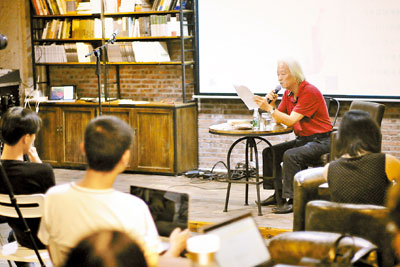Liao Zhenni jenna.liao@mail.utoronto.ca POETRY has always been open to multiple interpretations, according to Duo Duo, the first and only Chinese poet to win the Neustadt Prize. “Don’t ask for one single standard to understand my poems. I am not here to impose my own opinions on you,” he said at a seminar on poetic creativity held by Enclave Media in Shenzhen on Saturday. Posted and shared in various social media platforms such as Wechat and Douban, the event attracted over 80 poetry lovers to Enclave, a 24-hour independent bookstore in a factory building in Bagualing, Futian District. Quite a few attendees came from Guangzhou. “The unprecedented boom of social media brings puzzle-like poetry to a larger audience,” Zhang Er, a poet and event organizer, told Shenzhen Daily, “and people are enjoying increasingly easy access to poetry writing and reading.” 
Zhang founded the print poetry journal Enclave in 2012, and started a media business aimed at further promoting creative works in the new media era. Shenzhen-based designer Jin Zi attended the seminar with the friends she met at a local poetry community. Since its establishment last October, the community has held online forums and meetups, uniting nearly 400 poetry enthusiasts from film directors to financial professionals across a wide age range from 18 to 50, according to Jin. “Social media platforms have removed geographic barriers, allowing us to share our own or favorite works anytime and anywhere.” Two “90s generation” girls named Rachel and Na Ni had heard about Enclave while studying for their MA in Cultural Studies in Hong Kong, and kept a close eye on event updates on Enclave’s Wechat official account since their settlement in Shenzhen a few months ago. Moreover, the interactivity of social media makes it possible for amateur poets to discuss with and learn from peers, said Jiang Hua who runs a small business and spends his spare time writing poems. He said he enjoyed reading online comments on his works published in poetry journals such as South Poets. “The new era of digital media will bring marginalized poems into focus,” he added. On the other hand, hits on social platforms prove little about the quality of poems, Zhang said. Given an overwhelming amount of information available online, misleading works are common, which explains why he has invited China’s famous poets including Yale graduate Wang Ao to give a free speech to the public. Chinese contemporary poetry should not be limited to elites, nor be subject to market forces, he added. Looking through the poetry journal Enclave, one may find it interesting that it includes bilingual versions of both Chinese and foreign poems. Zhang highlighted that Enclave differs from other journals in selecting and editing contemporary foreign poets’ works instead of classic literature. Since modern poetry has its roots in Western literature, Zhang disagreed with isolating Chinese writers from great poets from the other end of the world. “Despite considerable differences in culture, economy and politics, we should take into account how our foreign peers handle linguistic issues and how they understand the relationship between individuals and society.” Zhang joined the migrant flow to Shenzhen in the 1990s and hosted a series of literary events in the young city since 2011. While Beijing- and Shanghai-based poets are often restricted by traditions, Shenzhen has emerged as a home for pioneers, and encourages exploration and experimentation in literature, he said. Also, the nature of a city of migrants can be inspiring for poetry. Working miles away from home may bring out emotions including homesickness, leading to the rise of migrant worker poets. As for poetry education, independence is a precondition of a successful poet, according to Duo Duo. “Efforts to guide or teach poetry writing are doomed to fail, but enlightenment that comes through reading helps.” Poetry writing depends largely on individual experiences and aspirations, and the so-called guidelines and theories usually put strains on creativity, he added. Zhang echoed that the most challenging part is reading large amounts of masterpieces to gain inspiration. | 
